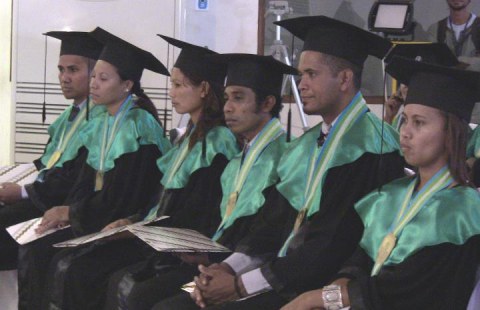By Tim Anderson
On 26 November 2012 more than 400 new doctors graduated in Timor Leste, bringing the total number of Cuban trained doctors to nearly 500.
The graduation was notable for two reasons: first, this was the largest graduation of doctors in the region (probably the largest in the world, outside Latin America); and second, it attracted not a single news story in the English speaking world.
A Cuban-backed medical certificate is the most widely recognised medical qualification in the world, for the simple reason that Cuba trains more doctors than anyone else. Cuban trained doctors are working everywhere, from New York to Timbuktu. Theirs is a system which focuses on social medicine and health promotion, alongside clinical medicine.
At this fourth graduation of doctors Prime Minister Xanana Gusmao made the same point former President Jose Ramos Horta made at the third graduation late last year: Timor Leste, which had the lowest proportion of doctors to population in South East Asia, would very soon have the highest. If that is not the case now, it certainly will be next year, when 300 more are set to graduate.
Apparently not one western news agency thought this noteworthy, despite the strong identification foreign aid agencies often make with development in Timor Leste.
In Australia a great fuss is made over very small aid projects in Timor Leste, if there is some Australian involvement. Not so with the Cuban plan to train an entire generation of public sector doctors. Worse, there seems no Australian interest in the tremendous achievement of all those hard-working young Timorese medical students.
Australian journalists and government officials were aware of the graduation, but said nothing. Can this reflect anything other than a vain self-image, than aid programs mean nothing, or are to be hidden, when they are not run by Australians?
The Cuba-Timor health cooperation program began in 2003, with the first 18 doctors graduating in September 2010. Two more graduations in 2011 made Cuban-trained doctors (all graduates from the National University of Timor Leste) the majority of Timorese doctors in the country – 80 out of 139.
Almost 500 sat their exams in late 2012, at five examination sites across the country. More than 90 of these did not pass, and will re-sit exams in April 2013. However 406 passed the practical and written exams, graduated and were sworn in as doctors on 26 November. In 2013 there will be another cohort of about 250, on top of the 90 or so who will re-sit exams.
Prime Minister Gusmao, in his presentation at the graduation, said the goal of this program was to have at least one doctor, two nurses, two midwifes and a laboratory technician in every Suco (= village, there are more than 400 of these) of the country.
That goal requires substantial investment, not least in properly employing all newly graduated doctors. At the moment Cuban doctors still dominate rural-based doctors with, for example, four Cuban doctors and one Cuban-trained Timorese doctor in each of Ermera and Viqueque districts.
To meet this goal, Timor Leste still has a long way to go. However, if the plan stays on track, new doctors will gradually replace the Cubans, then expand in numbers across the country.
The Cuban Ambassador to Timor Leste, Mr Luis Laffite, told the graduation audience that more than 850 Cuban doctors and specialists had worked in Timor Leste over the past eight years. They had provided free health care to Timor Leste’s population, while committing themselves to the promise (made by Fidel Castro to Mari Alkatiri in 2005) to train one thousand new doctors.
In addition to this, a Cuban literacy program which began in Portuguese but rapidly shifted into Tetun, has almost finished its first stage across the country. In the last five years almost 200,000 people graduated in the first stage of this program, and the country could be declared illiteracy free in early 2013. Of course, real literacy requires follow on programs, but any literacy will be of enormous assistance to health promotion programs, for example those in tuberculosis prevention.
There have been talks in recent months between the governments of Australia and Cuba, with a view to collaborate in health programs in the Pacific islands. These talks have extended to Timor Leste, with Australian postgraduate training being discussed with between Australian and Timorese doctors and officials. Yet it seems the Australian programs have not yet factored in language training, and English is still a weak language in Timor Leste.
At the same time, the Government of Timor Leste has asked the Cubans to provide 30 postgraduate places for some of their new doctors. It is likely that some of this specialist training will be done in Timor and some in Cuba. The Timorese government will probably fund it. Cuban officials planning these new agreements attended the 26 November graduation in Dili.

